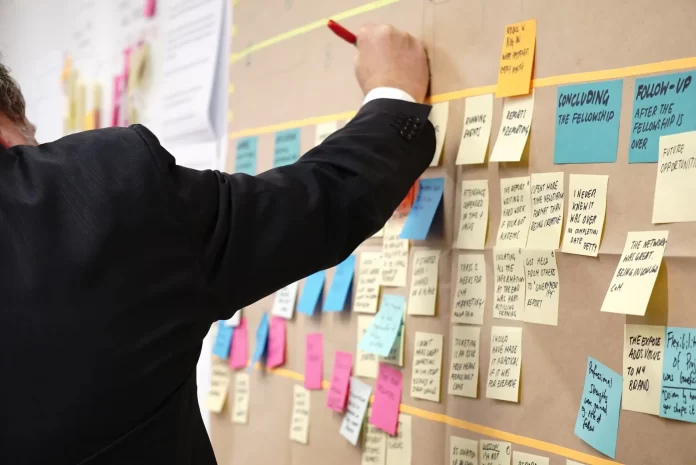Benchmarking Project management methodologies are critical in today’s business environment. Effective project management helps businesses streamline processes, manage resources efficiently, and achieve their goals within set timelines, and choosing the right methodology can make all the difference. There are various project management methodologies that organizations can use to manage their projects successfully. In this article, we’ll discuss the top three project management methodologies you should know about and how to implement them in your organization.
Project management methodologies explained
Agile Methodology
Agile is a project management methodology that emphasizes iterative and incremental development. This methodology is popular in software development, but it can be used in any project that requires flexibility and adaptability. The Agile methodology is based on four core values: individuals and interactions, working software, customer collaboration, and responding to change.
Agile projects are broken down into small, manageable pieces called sprints. Each sprint typically lasts between one to four weeks and involves planning, design, development, testing, and review. At the end of each sprint, the team delivers a working product increment that can be reviewed and tested by stakeholders.
One of the key benefits of Agile is its flexibility. Agile allows teams to adjust to changing requirements and priorities, which is especially important in fast-paced and dynamic environments. However, it requires a highly collaborative team and frequent communication to work effectively.
Actionable Tip: Implement daily stand-up meetings to improve communication and collaboration among team members.
Waterfall Methodology
The Waterfall methodology is a linear project management methodology that is used for projects with well-defined and stable requirements. This methodology is commonly used in construction, manufacturing, and engineering projects. The Waterfall methodology is based on a sequential process that follows a structured approach from start to finish.
Waterfall projects are divided into phases, each with its own set of requirements and deliverables. The phases typically include requirements gathering, design, implementation, testing, and maintenance. Once a phase is complete, the team moves onto the next phase.
One of the benefits of Waterfall is that it provides a clear and structured approach to project management. However, it can be less flexible than Agile and may not be suitable for projects with changing requirements.
Actionable Tip: Create a detailed project plan with clear milestones and deadlines to ensure that the project stays on track.
Scrum Methodology
Scrum is a project management methodology that is based on Agile principles. This methodology is commonly used in software development projects but can be used in any project that requires flexibility and adaptability. Scrum is an iterative and incremental approach that focuses on delivering value to the customer.
Scrum projects are broken down into sprints, similar to Agile. However, Scrum also includes three roles: the product owner, the Scrum master, and the development team. The product owner is responsible for the project’s vision and prioritizing the backlog, the Scrum master facilitates the process and removes obstacles, and the development team is responsible for delivering the product increment.
One of the benefits of Scrum is that it provides a clear structure for project management while also allowing for flexibility and adaptability. However, it requires a highly collaborative team and frequent communication to work effectively.
Actionable Tip: Hold a retrospective meeting at the end of each sprint to identify areas for improvement and make adjustments for future sprints.
FAQs
What are the advantages of using project management methodologies?
Project management methodologies help organizations manage projects more effectively, streamline processes, and deliver projects on time and within budget.
How can project management methodologies improve project outcomes?
Project management methodologies can improve project outcomes by providing a clear structure for project management, ensuring that projects stay on track, and allowing teams to manage resources effectively. By following a methodology that fits the project’s requirements, teams can ensure that the project is completed on time, within budget, and to the required quality standards. Additionally, methodologies can help teams manage risks, anticipate and respond to changing requirements, and ensure that stakeholders are kept informed throughout the project lifecycle.
Which project management methodology is best?
The best project management methodology depends on the project’s requirements, complexity, and scope. Agile, Waterfall, and Scrum are all effective methodologies that can be used in different situations.
How do I choose a project management methodology?
When choosing a project management methodology, consider the project’s requirements, scope, and complexity. Agile is best for projects with changing requirements, Waterfall is best for projects with well-defined requirements, and Scrum is best for projects that require both structure and flexibility. Consider the team’s skillset and experience with different methodologies as well. Ultimately, choose the methodology that best fits the project’s needs and the team’s capabilities.
Can project management methodologies be combined?
Yes, project management methodologies can be combined to create a hybrid approach that best fits the project’s needs. For example, a project could use Waterfall for the initial planning and design phases and then switch to Agile for the implementation and testing phases. However, it’s important to ensure that the hybrid approach is clearly defined and communicated to the team and stakeholders to avoid confusion and potential issues.


